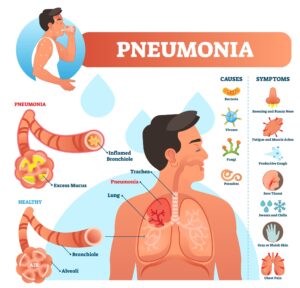What's On This Page?
ToggleIt’s a good question, right? Is pneumonia or bronchitis contagious? This is one of the most googled questions on the Internet. According to the National Institutes of Health, respiratory infections are responsible for nearly 4 million deaths globally every year! While that statistic includes many different illnesses, two common culprits – pneumonia and bronchitis—are often at the center of public concern, especially during cold and flu season. One of the most frequent questions I get as a pharmacist is: “Are these conditions contagious?”
The short answer? Yes, they can be – but not always. Scroll down below to see my list of natural remedies that can help.
Let’s unpack the differences between pneumonia and bronchitis, when you should worry about spreading them to others, and what you can do to protect your lungs, whether you lean more toward medication, natural remedies, or a combination of both.
What Is Bronchitis?
Bronchitis is an inflammation of the bronchial tubes, which carry air to and from your lungs. It often develops after a cold or other respiratory infection.
Common symptoms of bronchitis include:
- Persistent cough (often with mucus)
- Fatigue
- Mild fever and chills
- Chest discomfort
There are two types of Bronchitis:
- Acute bronchitis – Usually viral, short-lived, and contagious.
- Chronic bronchitis – A form of COPD (chronic obstructive pulmonary disease), often due to smoking, and not contagious.
Viral acute bronchitis is contagious, especially in the early stages. It spreads the same way a cold does—through droplets when someone coughs, sneezes, or touches shared surfaces. Here’s a link to the Mayo Clinic about BRONCHITIS.
What Is Pneumonia?
Pneumonia is an infection that inflames the air sacs in one or both lungs, which may fill with fluid or pus.
Symptoms can include:
- Cough (with phlegm or pus) – Read my other blog, 9 Amazing Natural Cough Suppressants to Shut You Up
- Fever, sweating, and shaking chills
- Shortness of breath – Revealing 15 Hidden Causes of Shortness of Breath and How to Overcome Them
- Chest pain when breathing or coughing
- Fatigue
Pneumonia can be caused by bacteria, viruses, or fungi. The most common bacterial form is Streptococcus pneumoniae. Viral pneumonia (like from influenza, covid or RSV) is contagious, whereas bacterial forms are less so, except in close-contact environments.
 So, Is It Contagious?
So, Is It Contagious?
Here’s a quick breakdown:
- Acute Bronchitis (usually viral) – Yes, contagious.
- Chronic Bronchitis (non-infectious) – No.
- Viral Pneumonia – Yes, contagious.
- Bacterial Pneumonia – Possibly, but less so. More of a concern in hospitals or care homes.
What About Asthma?
People with asthma are not contagious, but they are more vulnerable to complications from bronchitis and pneumonia. A respiratory infection can trigger asthma symptoms or even a full-blown attack. If you have asthma or care for someone who does, respiratory infections should be taken seriously. I wrote some other articles about asthma that will interest you:
4 Asthma Triggers: Breathe Easier with These Asthma Products.
Breathe Easy: Understanding Prescribed Asthma Medications
Sometimes difficulty breathing isn’t asthma, it’s related to this: 5 Hidden Links Between Hiatal Hernia, GERD & Shortness of Breath – and Solutions.
Medications That Can Help Pneumonia or Bronchitis
As a pharmacist with over 30 years of experience, I can tell you that targeted medications can make a world of difference:
- Bronchitis:
- For viral bronchitis: supportive care only (hydration, rest, OTC meds).
- For bacterial cases (less common): antibiotics like azithromycin or amoxicillin.
- Inhalers like albuterol (Ventolin) may be used for wheezing. By the way, albuterol may be useful for kids undergoing tonsillectomies – READ MORE.
- Pneumonia:
- Bacterial: antibiotics such as levofloxacin, doxycycline, or amoxicillin-clavulanate. Here’s something interesting for you to chew on: 7 Natural Alternatives to Antibiotics.
- Viral: antivirals may be considered in some cases (like oseltamivir for flu-related pneumonia).
- Fever and pain: acetaminophen or ibuprofen as needed. Do you know which of those two drugs is right for you? I wrote this exclusive ARTICLE to help you decide.
Always consult your healthcare provider before starting any medication.
7 Potential Natural Remedies to Help Your Lungs
If you prefer natural options or want to supplement your recovery, there are several herbs and remedies known to support lung health:
- N-acetylcysteine (NAC): Helps thin mucus and acts as an antioxidant.
- Lobelia: Traditionally used for breathing issues, though potent, so use with care.
- Licorice Root: Anti-inflammatory and soothing to mucous membranes. Find out how licorice helps fatigue and heartburn HERE.
- Eucalyptus Steam: Can help open airways and ease coughing.
- Thyme tea: Natural antimicrobial and cough-soothing properties.
- Vitamin C: Enhances white blood cell function and reducing inflammation, which can help your body fight off infections like bronchitis or pneumonia. It may also reduce the severity and duration of respiratory symptoms by protecting lung tissue from oxidative stress.
- Honey: Especially manuka, which has antibacterial properties. Read my other article, The Best Honey for Allergies: Raw Unfiltered vs. Pasteurized Comparison.
Also, don’t underestimate the power of a humidifier, warm soups, and plenty of hydration. Avoid smoke, strong fragrances, and other airway irritants while healing. I mentioned perfumes, did you know they are sometimes in your toilet paper? Read my other article to find out: The Bottom Line: The Surprising Truth About Your Toilet Paper.
Final Thoughts
Whether it’s viral bronchitis or bacterial pneumonia, the contagious nature of these illnesses depends on the cause. Understanding the signs and getting proper treatment early can reduce complications—especially for those with asthma or weakened immune systems.
If you found this helpful, please share it or comment below. Your lungs will thank you, and so will your family and friends!

Suzy Cohen, has been a licensed pharmacist for over 30 years and believes the best approach to chronic illness is a combination of natural medicine and conventional. She founded her own dietary supplement company specializing in custom-formulas, some of which have patents. With a special focus on functional medicine, thyroid health and drug nutrient depletion, Suzy is the author of several related books including Thyroid Healthy, Drug Muggers, Diabetes Without Drugs, and a nationally syndicated column.



